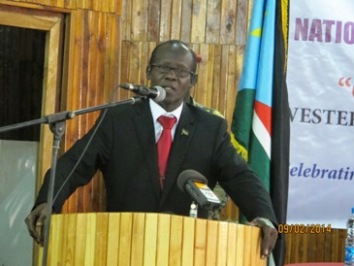Gov’t supports maintaining 32 states in South Sudan: Wani
November 4, 2018 (JUBA) – South Sudanese government would support the 32 states federal system which the opposition groups demand to bring to an end, said Vice President James Wani Igga Sunday during a visit to Yei River state.

Addressing the religious ceremony, Wani pointed out that the opposition contest the current federal system established by President Salva Kiir but his government would work within the agreed mechanism to defend it.
“I want to tell you that the issue of the states will be addressed by the IBC (Independent Boundaries Commission). We support the 32 states, and the people of Yei want the 32 states to remain so that services can be delivered,” he said.
He further said that the IBC will launch its activities soon to determine the number of the states.
The government and the opposition groups agree on the federal system of governance but diverge on the number of the administrative territorial entities and its boundaries.
IBC has to review the establishment of the new states and their boundaries and to make recommendations for addressing the consequences of these changes based on the tribal borders at the independence of Sudan in 1956.
The opposition forces say the current system is made in a way to legalise the control of fertile land by the Dinka ethnic groups.
Also, they say the expansion of the states from 10 to 32 states violates the 2015 peace agreement because it was implemented in October of the same year after the signing of the peace deal in August.
The non-signatory groups make of the number of states their principal reason to reject the revitalized peace agreement. Some of them wanted the number of states to be settled in the peace negotiations and not during the interim period.
The peace deal provides that if the IBC fails to reach an agreement on the number of states, a referendum should be held to determine its final number taking into account the 1956 border demarcation.
Speaking during the ceremony, Governor Anthony reiterated the commitment of his government to implement the revitalized peace agreement and other peace deals signed with the various armed groups in the state.
He further called on the holdout armed groups to join the “wagon of peace” and to contribute to the stability and development of their region.
He also praised the different churches for the mediation they conduct with the armed groups and contribution in the areas of healthcare, humanitarian assistance, education and development of the state.
Yei River State is one of the most troubled areas in South Sudan as the state witnesses sporadic clashes between the rebel fighters of the National Salvation Front led by Thomas Cirilo Swaka with the government or the SPLM-IO forces.
(ST)
